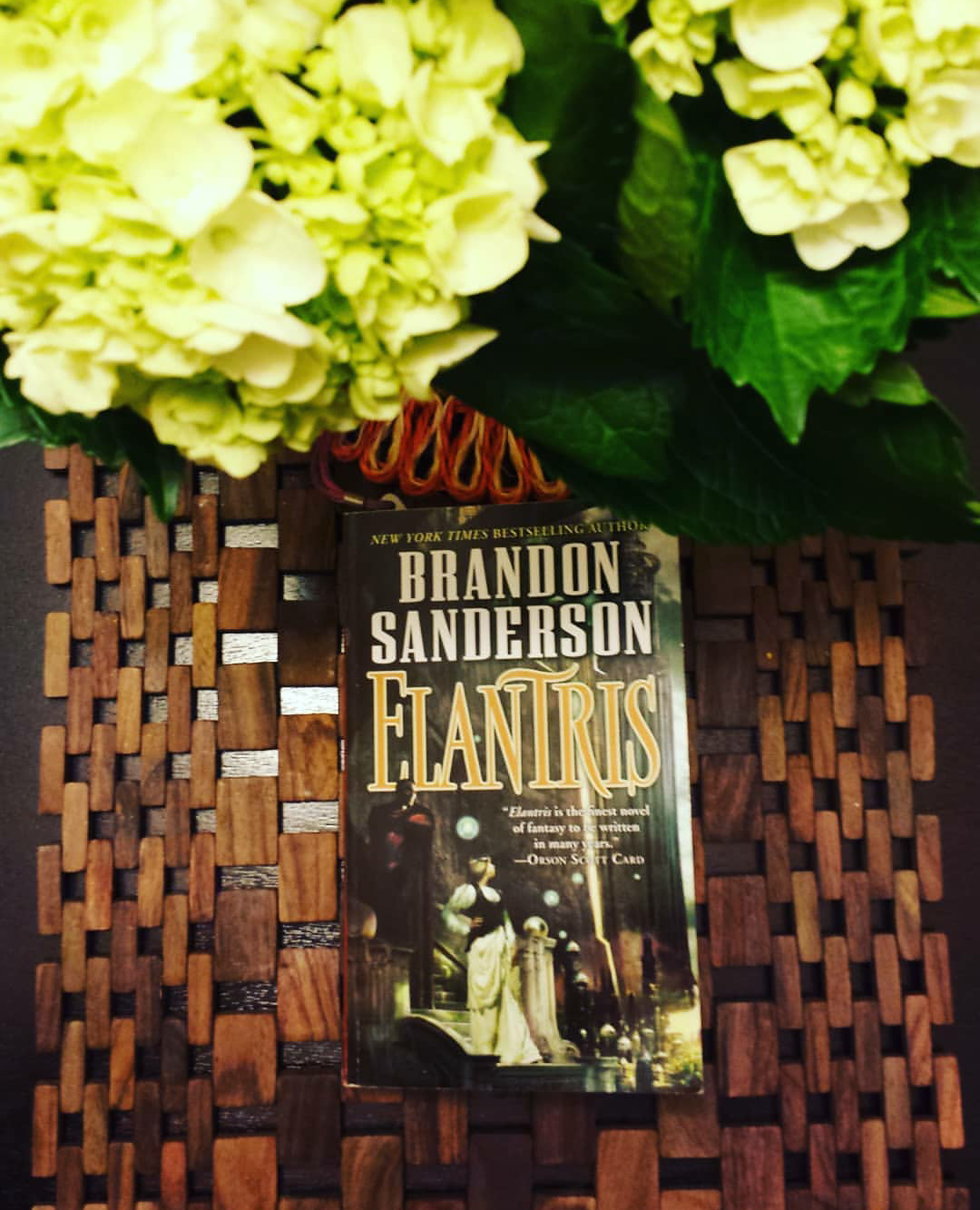I first heard Brandon Sanderson’s name when he was hired to complete Robert Jordan’s mammoth The Wheel of Time fantasy series after Mr. Jordan passed away in 2007 — gee, has it been 11 years already? The Wheel of Time was a favorite series of a few friends of mine, but I never tackled it and so I missed my first potential exposure to Sanderson’s talent. I then started seeing Sanderson’s name mentioned in discussion forums like Shelfari and Goodreads and hearing about him on bookcentric podcasts like Sword & Laser. Then some commentators I trust began shouting his name from the mountaintops after Sanderson’s The Way of Kings was released. I started doing something weird. I bought The Way of Kings, the first book of a series called The Stormlight Archive, but I was not able to read it yet. Then book two of The Stormlight Archive, Words of Radiance — what a beautiful title — was released and I bought that, still having not read The Way of Kings. Then the third title, Oathbreaker, hit store shelves and I exchanged my paycheck for it. Here is the truly bizarre aspect of this entire situation: I still have not read any of them. Is it not madness to buy the second and third volumes of a series when one has not yet read the first? There is a Japanese term for this practice of continuing to buy books but not reading them: 積ん読 or tsundoku. Here is an applicable quote attributed to American author Alfred Edward Newton:
Even when reading is impossible, the presence of books acquired produces such an ecstasy that the buying of more books than one can read is nothing less than the soul reaching towards infinity … we cherish books even if unread, their mere presence exudes comfort, their ready access reassurance.
Right? If you are reading this, you are probably an avid reader like me and nodded in agreement while reading that quote. Welcome, brethren. So here I was with this condition I now know is called tsundoku and a heap of unread Brandon Sanderson novels. Three beautiful hardcover volumes comprised of three thousand three hundred forty two pages. It is intimidating. Then a colleague gave me a copy of Elantris, Brandon Sanderson’s debut novel. Unlike much of Sanderson’s later work, Elantris is a single story encased in a single volume. Being the man’s debut novel, I decided this was the best place to begin exploring his work and so on a warm, midsummer night, I entered the gates of Elantris. Holy cow, smoke, and Toledo, y’all. I enjoyed this story so much!
When the beloved Prince Raoden of Arelon wakes up one morning to discover he has been afflicted with a magical disease, his father the king secretly exiles him to the nearby walled city of Elantris. Once a majestic and beautiful city inhabited by people with godlike powers, Elantris is now a festering prison populated by the rotting unfortunates slung low by the disease known as the Shaod. Raoden must now fight the debilitating effects of his disease as he attempts to investigate the cause of the fall of Elantris with the hope of restoring the city to its former glory and healing himself and the hundreds of others with his condition. The Shaod brings madness quickly though so Raoden has little time before he is lost forever. Outside the walls, Teoish princess Sarene arrives in the kingdom to discover the man she was to marry has mysteriously died. She suspects foul play and conspiracy and begins an investigation to discover what really happened to her betrothed. As she works, she allies herself with a group of nobles with designs to overthrow the corrupt king of Arelon and becomes embroiled in a dangerous political coup just as the external forces of neighboring Fjordell threaten to assault Arelon. High Priest Hrathen of Fjordell has seen what war does to a kingdom his nation means to subjugate and so has just ninety days to peacefully convert the people of Arelon to his nation’s religion before the powerful armies of Fjordell arrive to bring destruction and death to the unfaithful.
All three primary characters are so enjoyable that I found myself conflicted when a chapter switched perspective from one character to another. I wanted to remain with each of them and continue exploring their story and their world, but I was also excited to learn more about the other two characters. This inspired me to read deeply and quickly as I thirsted for more information about each character. Even Hrathen, who is supposed to be the villain, is so deserving of empathy that I found myself struggling to hate him even as he executed his plans to bring about the conquest of the kingdom of Arelon. Prince Raoden is exactly the kind of leader I wish to be: decisive, intelligent, earnest, clever, empathetic. I loved his chapters and rooted so strongly for him. Sarene is a wonderful character, a strong female protagonist in a patriarchal society, fighting for truth and for civil rights in a kingdom foreign to her.
If you enjoy fantasy novels that are not just all about sword fights, stories that include intrigue and clever magic systems, read Elantris. If you have not read a Brandon Sanderson novel yet, this one will make you a fan and is an excellent example of his talent as a storyteller. I have a lot of Sanderson still on my shelf and the tsundoku still rages, but reading Elantris is a positive first step toward controlling it. One page at a time.




